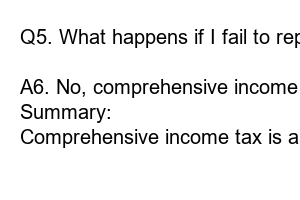종합소득세 대상자
Subject to Comprehensive Income Tax: Understanding its Implications
Have you ever wondered what exactly comprehensive income tax is and how it affects your finances? In this blog post, we will delve into the details of this tax and provide a comprehensive overview of its implications. So, let’s get started!
1. A Brief Introduction
Comprehensive income tax is a type of tax that encompasses various sources of income within its purview. Unlike traditional income taxes that only consider wages and salaries, comprehensive income tax takes into account all sources of income, such as investments, dividends, rental income, and capital gains. This means that regardless of how you earn money, you are subject to comprehensive income tax.
2. Understanding the Scope
Unlike other forms of taxation, comprehensive income tax aims to create a more equitable tax system by ensuring that everyone pays their fair share. By expanding the scope of taxable income, the government can capture income from diverse sources, resulting in higher revenue generation. Consequently, this allows for increased funding of public services and redistribution of wealth.
3. Calculating Comprehensive Income Tax
To calculate your comprehensive income tax, you need to account for all sources of income and apply the relevant tax rates. This can be a complex process, as each source of income might have varying tax calculations and deductions. Consulting a tax professional is crucial to ensure accurate calculations and to maximize any potential deductions or credits.
4. Implications for Individuals and Businesses
Comprehensive income tax can have significant implications for both individuals and businesses. Individuals with multiple sources of income may need to adjust their financial planning and tax strategies to minimize their tax burden. Similarly, businesses need to accurately account for all sources of income to ensure compliant reporting, avoiding potential penalties and legal issues.
5. Planning for Comprehensive Income Tax
To effectively plan for comprehensive income tax, individuals and businesses need to consider various factors. These include optimizing deductions and credits, exploring tax-efficient investment options, and structuring income sources to reduce tax liabilities. Engaging the services of a qualified tax advisor is essential to navigate these complexities and devise a comprehensive tax planning strategy.
6. Advantages and Disadvantages
While comprehensive income tax promotes fairness and revenue generation, it does come with its own set of advantages and disadvantages. On the positive side, it ensures a more equitable distribution of the tax burden and reduces the possibility of tax evasion. However, the complexities involved in calculating comprehensive income tax can be time-consuming and burdensome for individuals and businesses, leading to additional costs.
FAQs
Q1. Do I need to pay comprehensive income tax if my only source of income is my salary?
A1. No, comprehensive income tax applies to individuals with multiple income sources, such as investments, rental income, or capital gains.
Q2. Can I deduct expenses related to my investment income when calculating comprehensive income tax?
A2. Yes, certain expenses related to investments can be deductible when calculating comprehensive income tax. However, the rules vary, and it’s advisable to consult a tax professional.
Q3. Are there any deductions or credits available to reduce comprehensive income tax liabilities?
A3. Yes, deductions and credits may be available to reduce comprehensive income tax liabilities. These can include deductions for expenses related to business income or educational expenses, among others.
Q4. Are self-employed individuals subject to comprehensive income tax?
A4. Yes, self-employed individuals are subject to comprehensive income tax as they typically have multiple sources of income, such as business income and investments.
Q5. What happens if I fail to report a source of income when filing for comprehensive income tax?
A5. Failing to report a source of income when filing for comprehensive income tax can lead to penalties, fines, and potential legal consequences. It is essential to accurately report all sources of income.
Q6. Is comprehensive income tax the same as progressive income tax?
A6. No, comprehensive income tax refers to the inclusion of all sources of income within the tax calculation, whereas progressive income tax pertains to tax rates that increase as income levels rise.
Summary:
Comprehensive income tax is a type of tax that encompasses all sources of income, ensuring a fair distribution of the tax burden. It requires individuals and businesses to accurately account for multiple income sources and apply the relevant tax rates. While it promotes fairness, it can be complex and time-consuming, necessitating the help of tax professionals. By understanding the implications of comprehensive income tax, individuals and businesses can effectively plan to optimize their tax strategies.

